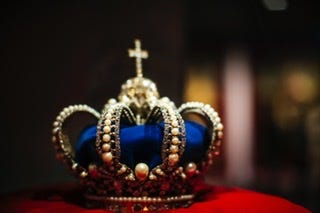From the PITT Substack:
Dear Zane,
I have good news! But before I share that, let me pause to pat myself on the back for using your “true” name. It took me a while and a lot of reminders from you. But, believe me, I’ve got it now.
On to my own good news—I’ve also discovered my authentic self! Remember how I used to sometimes be nervous before attending social events, anxious about my career and concerned about the future? Now I understand that my depression, anxiety and lack of confidence were all due to not living as my authentic self. You see, I am trapped in the wrong body. My mind and soul don’t match my exterior, the one the world sees.
Yes, I’m still your Mom, but I can no longer live a lie. I identify as a princess and am transroyal.
Let me explain. Children are not born knowing what it means to be a commoner or royalty; they learn it from their parents, other children, and society at large. This learning process begins early. As soon as family, neighbors, teachers, and doctors, based on observing the newborn’s family, begin treating the child as non-royal, the world around the child begins to reinforce that misperception, whether it’s expecting them to do chores, attending public schools or traveling without an entourage. This unnatural state foisted on the child by society continues into puberty and adulthood as social expectations of commoner’s expressions and behavior often become more rigid. But royalty does not simply exist in those binary (commoner versus royalty) terms: It’s more of a spectrum, with all individuals expressing and identifying with varying degrees of both commoner and royalty. Transroyal people identify along this spectrum, but also identify as a class that is different than the one they were assigned at birth.
I was assigned commoner at birth. I didn’t ask for this. This dysphoria between my royal soul and my class assigned at birth is, at best, a source of daily irritation and, at worst, an existential pain that can only be resolved by the rest of the world recognizing my true nobility.
This identity and expression are central to the way I see myself and engage with the world around me. Family support is absolutely critical here. In fact, based on identity research, we know that royalty-affirming behavior on the part of family and friends greatly improves mental health and well-being. And failure to do so—not acknowledging our lived experience—makes transroyal people likely to experience anxiety, depression, and at greater risk of substance abuse. So please don’t expect me to do the dishes anymore.
Transroyals, like commoners, know who we are. But the difference for transroyals is that the world doesn’t believe us. If we say, “I am a princess” or “I am a prince”—structures of power and individuals in our lives doubt us. Let’s say we need to be the first to board an airplane (for security purposes, of course) and we approach the boarding agent. We are asked to prove our royal status. But we just know. Just as a commoner would say, “I just know who I am”, so too do transroyals. We are doubted, over and over. And disbelieved. If your response here as a commoner is “I don’t just know. I can prove it because of my blood lines”—then you are reducing people to bodily fluids, not us.
Transroyal people exist!
Devotedly,
Your loving mother
Note: This is clearly parody— but lest you think this is too extreme, note that paragraph four was lifted from the “Gender Basics” section of the Transgender Children & Youth: Understanding the Basics site, only substituting royal versus commoner for gender.
And the last paragraph was copied from a tweet by Chase Strangio (Deputy Director for Transgender Justice with the ACLU’s LGBT & HIV Project). The writer changed male and female to prince and princess, and changed “body parts” to “blood lines”.
















